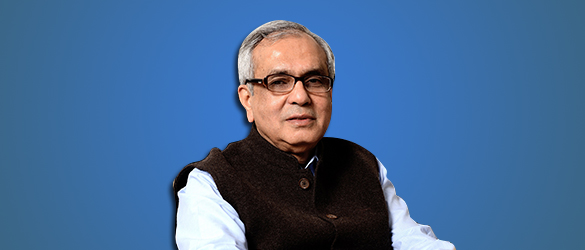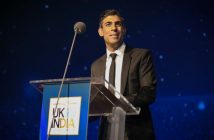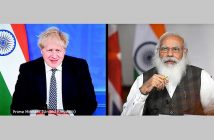Dr Kumar must build the organisation into a strong and vibrant think tank that advises the government on all facets of policy, writes India Inc. Founder & CEO Manoj Ladwa.
I am delighted that my dear friend and a regular columnist in our publications, Dr Rajiv Kumar, has been appointed Deputy Chairman of Niti Aayog, the government of India’s policy think tank.
He will take charge at a time when the Indian economy is throwing up a mixed bag of results. The mid-year Economic Survey, tabled in Parliament earlier today, says it will be difficult for the economy to reach the higher end of the 6.75-7.50 per cent growth band it had earlier predicted for 2017-18. Several other indicators apart from the headline GDP figure, such as IIP, credit growth, investment and capacity utilisation also point to a deceleration in the economy, the survey pointed out.
There is a plethora of other questions he will have to find answers to, as well, but we will come to those in just a bit. Dr Kumar steps into the shoes of Dr Arvind Panagariya, a celebrated professor of economics at Columbia University, who proved in the end too bookish, aloof and, therefore, ineffective.
Like any other capital city, New Delhi, too, has its own networks of influence and power centres that make the wheels of government go around. Even the most powerful administrators and academics need to factor these into their calculations if they want to be effective.
Dr Kumar is well networked in New Delhi’s power corridors, having worked earlier as Chief Economist at the Confederation of Indian Industry (CII) and as Secretary General of the Federation of Indian Chambers of Commerce and Industry (FICCI). Then, he has written several books, including a recent one of Prime Minister Narendra Modi, and also worked on the BJP’s 2014 vision document. And finally, he is understated and has a liberal economic outlook, without being a liberal hawk, which should sit well with the current government’s priorities.
He will need all his acumen and experience, not to speak of his deep first-hand knowledge of the inner workings of the Indian economy, to build stronger bridges with the Prime Minister’s Office, important ministries and different state governments and to “sell” his ideas to the government and bureaucracy. That is the only way he can build Niti Aayog into a strong and vibrant think tank that advises the government on all facets of policy and governance.
In my view, the most important task before the government today is to create jobs. It is also the most difficult. The underlying reasons are fairly clear. Capacity utilisation in the Indian industry is currently at 70-72 per cent, quite a bit below the 80 per cent threshold at which companies begin to consider expansion. No wonder the investment rate has fallen almost 10 percentage points to 27.9 per cent in 2016-17 from 37 per cent in 2007. The savings rate, too, is down to 32.3 per cent in 2015-16 from 33.1 per cent the previous year. These figures point to the absence of sufficient demand in the economy.
In the absence of a magic wand, Dr Kumar will have to come up with a workable and politically acceptable solution to the issue. Textiles and tourism are sectors where jobs can be rapidly created and I am guessing that these will be the ones he will address on a priority basis. Education and healthcare are two other sectors that directly affect ordinary people and the Modi government must now deliver visible results in these areas. Dr Kumar will have to see how the Centre can motivate the states (both are on the concurrent list and, hence, the responsibility of both the federal government as well as the states) to reform entrenched practices to improve performance.
Education and healthcare are two other sectors that directly affect ordinary people and the Modi government must now deliver visible results in these areas. Dr Kumar will have to see how the Centre can motivate the states (both are on the concurrent list and, hence, the responsibility of both the federal government as well as the states) to reform entrenched practices to improve performance.
And as I had written last week, India is staring at a major water crisis and needs urgent steps to conserve water and improve the efficiency of its utilisation. I feel the government owes it to the people of India to provide clean and safe water to the entire population. This must be done in mission mode.
Next week, India will celebrate the 70th anniversary of Independence. Two years ago, the Prime Minister boldly shed the government’s lingering dependence on failed Soviet-style planning to usher in a more open development template.
When Dr Kumar assumes charge at Niti Aayog at the end of this month, he will do well to follow up some initiatives undertaken in line with Modi’s vision. These include the roadmap to revitalise agriculture and double farm incomes by 2022, a model land leasing law (very important in the absence of any progress on evolving a political consensus on a more progressive land acquisition law in place of the draconian one enacted by the previous Congress regime in 2013, the plan to eliminate (and not just mitigate) poverty in a time-bound manner, increasing the penetration of digital payments and, in the non-economic sphere, my particular passion – developing a programme for India to win at least 50 Olympic medals.
I could go on… but the laundry list above is enough to show how challenging the road ahead is. I’m sure all of you will join me in wishing Dr Kumar, who has a D. Phil in Economics from Oxford University and a PhD in the same subject from Lucknow University, the best of luck and all success in his new assignment – not just for his own sake but for the sake of India’s future as well.
Manoj Ladwa is the founder of India Inc. and chief executive of MLS Chase Group @manojladwa







